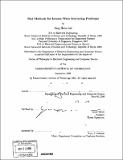Fast methods for inverse wave scattering problems
Author(s)
Lee, Jung Hoon, Ph. D. Massachusetts Institute of Technology
DownloadFull printable version (19.57Mb)
Other Contributors
Massachusetts Institute of Technology. Dept. of Electrical Engineering and Computer Science.
Advisor
Jacob White.
Terms of use
Metadata
Show full item recordAbstract
Inverse wave scattering problems arise in many applications including computerized/diffraction tomography, seismology, diffraction/holographic grating design, object identification from radar singals, and semiconductor quality control. Efficient algorithms exist for some inverse wave scattering problems in the low- and high-frequency regime or with weak scatterers. However, inverse wave scattering problems in the resonance regime with strong scatterers still pose many challenges. This thesis proposes algorithms for inverse wave scattering problems in the resonance regime with strong scatterers. These problems are part of, for instance, grating design, object identification, and semiconductor quality control. The proposed methods are (a) a spectrally convergent Nyström method for periodic structures in 2-D; (b) a fast Jacobian approximation method accompanying a Nyström method; (c) a fast and accurate method for evaluating the potential integrals in the 3-D mixed-potential integral operator with the Rao-Wilton-Glisson basis function; and (d) optimization with parameterized reduced-order models. The Nyström method and the method to evaluate the potential integrals accelerate scattered field evaluations by solving integral equations efficiently. The Jacobian approximation method and optimization with parameterized reduced-order models efficiently couple algorithms to evaluate scattered fields due to a guess of the scatterer and optimization methods to improve the guess. The Nyström and the Jacobian approximation methods are used to identify the parameters characterizing a periodic dielectric grating in 2-D. The method to evaluate the potential integrals and optimization with parameterized reduced-order models are applied to the problem of identifying simple discrete geometries in 3-D.
Description
Thesis (Ph. D.)--Massachusetts Institute of Technology, Dept. of Electrical Engineering and Computer Science, 2008. Includes bibliographical references (p. 125-137).
Date issued
2008Department
Massachusetts Institute of Technology. Department of Electrical Engineering and Computer SciencePublisher
Massachusetts Institute of Technology
Keywords
Electrical Engineering and Computer Science.